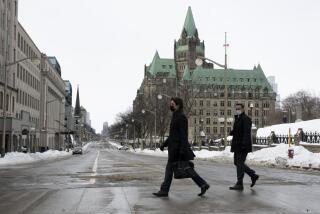Activist’s Bid for Freedom Blocked : Refuses to Cooperate With Probe of N.Y. Brink’s Holdup
- Share via
Watani Tyehimba, a black activist who has been imprisoned for nearly a year for refusing to cooperate with a federal grand jury, lost a bid for freedom in Los Angeles Tuesday.
The case involving Tyehimba stems from the holdup of a Brink’s armored car in New York that left two police officers and a security guard dead.
Judge’s Determination
U.S. District Judge William D. Keller ordered Tyehimba, who is under investigation for harboring the alleged mastermind of the 1981 robbery, held on civil contempt charges for as long as four more months--or until he agrees to provide handwriting samples requested by a Los Angeles federal grand jury which is probing local connections to the bloody East Coast holdup.
“The order is a most important order of the court, and I intend to have it followed,” Keller declared at the conclusion of a two-hour hearing as dozens of Tyehimba’s supporters looked on.
Tyehimba is a longtime activist in the New Afrikan People’s Organization and the New Afrikan Independence Movement, both of which advocate an independent state for blacks within the United States.
The 36-year-old former United Parcel Service mechanic and father of three was jailed Aug. 21, 1986, after he refused to provide a photograph of himself, fingerprints and samples of his handwriting to the grand jury.
Federal prosecutors say Tyehimba is believed to have assisted in harboring two alleged participants in the October, 1981, holdup, including the reputed mastermind, Mutulu Shakur, and an associate, Cheri Dalton.
Shakur has been identified by the FBI as the kingpin of the Black Liberation Army, which claimed responsibility for the holdup, and has been charged with a series of other Brink’s holdups between 1978 and 1982.
Arrested in Los Angeles on Feb. 11, 1986, Shakur is awaiting trial on federal conspiracy, racketeering, murder and armed robbery charges in connection with the holdup. Dalton, who with Shakur was on the FBI’s 10 Most Wanted list, is still at large.
It was only through the “above ground” assistance of people like Tyehimba that Shakur was able to avoid apprehension for as long as he did and that Dalton was able to remain at large, Assistant U.S. Atty. J. Stephen Czuleger argued in court papers.
Tyehimba claims he has been incarcerated “for taking a principled stand of non-collaboration” with the grand jury.
‘Will Not Collaborate’
“I will not betray the memories of all those who have struggled before me, and I will not endanger those who struggle now. I will not collaborate with the grand jury,” he said in a sworn declaration filed with the court.
Indeed, in Tuesday’s hearing, Tyehimba avowed that, although he has lost his job and his wife has been forced to take two jobs since his incarceration, his year at Terminal Island Federal Prison “has actually made me more resolved . . . . The only thing it made me do is reflect on the things our people have gone through.”
U.S. District Judge James M. Ideman’s original order imprisoning Tyehimba last year prompted a violent demonstration in the courtroom that resulted in four arrests, an incident that supporters blamed on over-aggressive federal marshals, but which Czuleger described as “a riot.”
Keller opened Tuesday’s hearing by sternly ordering one recalcitrant member of the audience to stand as he entered the courtroom, and he threatened at one point to jail both observers and attorneys should events get out of hand.
But in a largely uneventful hearing, Tyehimba’s attorneys, Dennis Cunningham and Chokwe Lumumba, argued that recent appellate court decisions require that Tyehimba be freed, unless there is evidence that continued incarceration would coerce him to provide what the grand jury is seeking.
“What we’ve done is gone beyond the point of coercion and into the point of punitive incarceration,” Lumumba argued.
Czuleger disagreed. “If we wanted to punish the defendant, we could indict him,” he said. “I want the evidence. The government and the grand jury want the evidence.”
Under federal law, persons deemed in contempt of grand juries can be imprisoned for as long as 18 months, or until the end of the grand jury’s term. Under the law, and by Keller’s order Tuesday, Tyehimba could be held until December.
More to Read
Sign up for Essential California
The most important California stories and recommendations in your inbox every morning.
You may occasionally receive promotional content from the Los Angeles Times.












